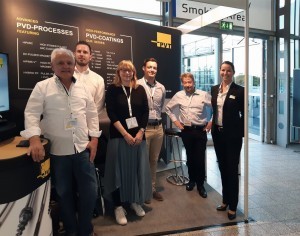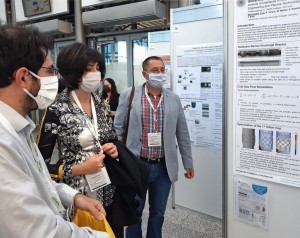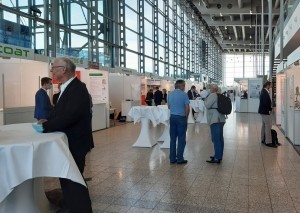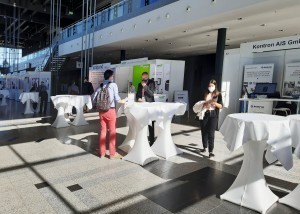Due to the coronavirus, the PSE (International Conference on Plasma Surface Engineering) moved from Garmisch to Erfurt last fall.
The conference
The event was organized by the European Society of Thin Films (EFDS) with the support of the European Joint Committee on Plasma and Ion Surface Engineering (EJC/PISE) and PLASMA GERMANY. Messe Erfurt, with its spacious, light-filled facilities, was an excellent alternative venue, with strict but achievable health and safety requirements for participants. Erfurt offered every opportunity and so, with 224 participants, 42 exhibitors and 144 speakers, the conference was a smaller but attractive sister to its larger predecessors.
PSE has always been an established and leading forum in the field of plasma, ion and particle beam assisted surface modification and thin film technology. This year's conference focused on "Plasma technology for new energy concepts". The development of new concepts for the energy transition has accelerated significantly in recent years, and research and industry are very active in this field. The reduction of ourCO2 footprint through, for example, new concepts for energy storage or the use of hydrogen as a fuel also represents a challenge for plasma and surface technology. Possible solutions were presented and discussed in many research and technology-oriented presentations and posters. New energy concepts that are already application-oriented were dealt with separately in an industry workshop.
However, the otherwise very important range of topics, which reflects the importance of plasma surface technology as a cross-sectional technology for numerous areas of application, was once again presented in the 17 sessions and 144 presentations at the conference. The contributions ranged from the basics, such as process modeling and simulation of plasmas or physical properties of thin-film systems, to new findings on the further development of the technology, to applications and new developments in industry for numerous fields of application.
The Special PSE 2020 began in stages with further training courses in the form of three tutorials:
- Tutorial 1: Fundamentals and Trends of Surface processing
- Tutorial 2: Pulsed Plasmas and Their Applications
- Tutorial 3: Processing of Flexible Glass - Challenges and Opportunities (SVC C -341)
In addition to the lectures, there were poster presentations, which were well attended by the participants and used as an opportunity for further information and networking.
This year's PSE partner country, the Czech Republic, presented itself both in a Partner Country Session and with several contributions at the conference. Czech researchers have been active in the field of plasma and ion surface treatment for many years.
The presentations of the Special PSE 2020 are briefly listed in the conference proceedings. Those interested in details are asked to contact the EFDS directly (www.efds.org).
The opening
After Prof. Dr. Christian Oehr, Chairman of PLASMA GERMANY and committee member of the EJC/PISE, had opened the conference, Conference Chairman Prof. Jaroslav Vlcek welcomed the participants. This was followed by words of welcome from the Thuringian Minister for Economic Affairs, Science and Digital Society, Wolfgang Tiefensee, who expressed his pleasure at being able to welcome the traditional conference to Erfurt. The Minister concluded by saying that he could well imagine Erfurt hosting the PSE conference again in the future.
Pictures from top to bottom: Poster presentations complemented the conference lectures. The extensive halls of Messe Erfurt offered participants both contact opportunities and the necessary distances for safety and health
The opening event was rounded off by the plenary lecture by Prof. Dr.-Ing. Tim Hosenfeldt, Schaeffler AG, Herzogenaurach, "CO2-neutral mobility as a challenge and opportunity for plasma surface technology throughout the energy chain." The speaker provided an overview of the possible steps towardsCO2-neutral mobility, in which "green energy" will increasingly take over the role of existing fossil fuels. He presented various friction- and wear-reducing tribological coatings from his company, for the production of which plasma surface technology plays an important role. Using the valve train as an example, he was able to show that these coatings can significantly reduce friction and thus achieve considerable energy savings. Coatings deposited on metallic bipolar plates of fuel cells using plasma technology can, among other things, increase their service life. Schaeffler has developed a nanostructured coating system in which various metals, nitrides and carbides are combined. Coatings deposited using plasma technology are also of interest for wind turbines that supply "green energy".
Further highlights
 42 exhibitors offered their products and services at the conference Presentation of the Rudolf Jaeckel Prize 2020, which is awarded annually by the German Vacuum Society DVG e.V. to outstanding researchers in the field of vacuum technology. This year's winner was Prof. Dr. Marius Grundmann, Head of Semiconductor Physics at the Felix Bloch Institute for Solid State Physics at Leipzig University. Grundmann was honored for his groundbreaking work in the development of innovative broadband semiconductor structures and the creation of demonstrators of electronic components based on these concepts. The winner presented information about his work in his lecture "Development of Ultrawide-Gap Semiconductors and Demonstration of Devices".
42 exhibitors offered their products and services at the conference Presentation of the Rudolf Jaeckel Prize 2020, which is awarded annually by the German Vacuum Society DVG e.V. to outstanding researchers in the field of vacuum technology. This year's winner was Prof. Dr. Marius Grundmann, Head of Semiconductor Physics at the Felix Bloch Institute for Solid State Physics at Leipzig University. Grundmann was honored for his groundbreaking work in the development of innovative broadband semiconductor structures and the creation of demonstrators of electronic components based on these concepts. The winner presented information about his work in his lecture "Development of Ultrawide-Gap Semiconductors and Demonstration of Devices".
The PSE Leading Scientist Award 2020 was also presented, this time to Prof. Allan Matthews, University of Manchester, UK. During the award ceremony, the speaker reported on "Stages in the progress of plasma-assisted PVD since its discovery and challenges for coating processes in future manufacturing". The EJC/PISE honored promising young scientists with the PSE Early Career Awards. Three young researchers from France, Iran and Portugal received their awards during the award session at the start of the third day of the conference.
Despite corona-related restrictions, the spacious rooms at the Erfurt Exhibition Center offered participants plenty of space to socialize and make new contacts during the breaks in the conference and the Welcome and Industrial Evening.
This also applied to the industrial exhibition, which gave 42 exhibitors from many companies and institutes the opportunity to present their products, services and new developments in the industry. Even though not all of the originally planned exhibitors were able to attend, the industrial exhibition still reached a considerable size with traditional and new partners and represented a cross-section of research institutes, system manufacturers and users that are important for plasma technology.
The main conference theme was also reflected in the traditional industry workshop focusing on "Plasma technology for new energy concepts". The workshop was prepared by the Conference Co-Chairman, Dr. Jan Gerrit van der Kolk, and provided information on the contribution that plasma surface technology processes can make to new energy concepts such as fuel cells, batteries or hydrogen technology. The presentations covered topics such as reducing the susceptibility to corrosion of bipolar plates in fuel cells through coatings, preventing hydrogen embrittlement of titanium components in electrolysis cells and methods for generating hydrogen directly in solar cells.
Next conference
The "18th International Conference on Plasma Surface Engineering" is planned for September 5-9, 2022.





